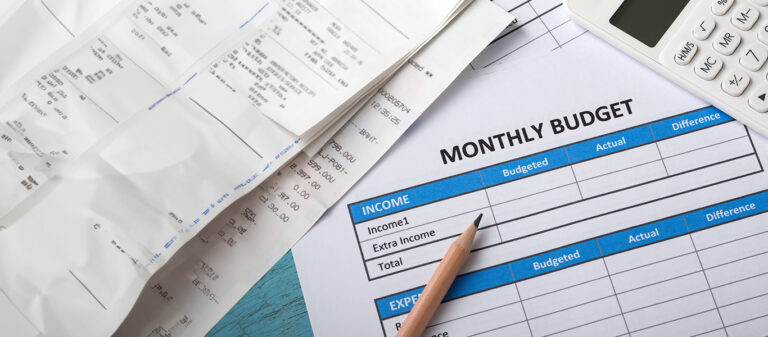What are the components of a budget?
Please rotate your device for the best experience.
Transcript
Anatomy of a Budget
Video Testimonial
Female teenager giving testimonial: Keeping a budget changed my life! I didn’t even know what a budget was until a few years ago. Money came in, and money went out. When I spent it all, I had to borrow from credit cards.
Then my credit cards got maxed out, and I was spending a lot on interest. I asked for help and learned about a budget.
It took a few months to get in the habit of tracking everything I spent. That’s because I was spending too much! I challenged myself to stop wasting money on things that seemed minor but added up. Like $8 smoothies and $5 coffees. Rideshares instead of the bus. Whatever I saved—even if it was pennies—I put in the bank. And 3 years later, I had saved enough to buy my first car!
Interactive Video
[A man sitting at his desk, writing on a financial document. There are two piles of cash, a laptop, and a calculator next to him.]
Narrator: So, why is having a budget such a big deal? It comes down to accountability to help you manage your money.
[A man lifting a monster truck tire as his personal trainer encourages him.]
Think of a budget like a personal trainer. It helps you set goals, create a plan, and monitor your progress.
A budget takes into account two key elements: your net income and your expenses.
Out of that net income, you have to pay your expenses. Some expenses occur every single month; these are fixed expenses, such as rent or health insurance. [An apartment building and heart with a medical cross in the middle of it appear and are labeled “fixed.”] Other expenses change from month to month, such as electricity, gasoline or entertainment; these are variable expenses. [A lightbulb, a gas pump, and movie tickets appear and are labeled “variable.”] And some only happen when the need arises, such as house repairs or a birthday present for a friend; these are periodic expenses. [A hammer and wrench and a birthday present appear and are labeled “periodic.”]
[On screen text: Help Richard classify his income and expenses.]
Next, let’s take a closer look at the categories in a budget. Help Richard classify his income and expenses.
[Table of Richard’s income and expenses]
bi-weekly paycheck 1; Cost: $1,118; Category: ?
savings; Cost: $100; Category: ?
rent; Cost: $800; Category: ?
electricity; Cost: $60; Category: ?
water; Cost: $45; Category: ?
bus pass; Cost: $65, Category: ?
biweekly paycheck 2; Cost: $1,118; Category: ?
groceries; Cost: $442, Category: ?
cell phone; Cost: $60, Category: ?
doctor’s visit; Cost: $35, Category: ?
printer ink; Cost: $80, Category: ?
clothing; Cost: $200, Category: ?
gifts; Cost: $50, Category: ?
credit card payment; Cost: $180; Category: ?
Balance: $119
[Interactive drop-down menu.]
Select the appropriate category for each item using the drop-down menus.
Items:
- Biweekly paycheck 1: $1,118
- Savings: $100
- Rent: $800
- Electricity: $60
- Water: $45
- Bus pass: $65
- Biweekly paycheck 2: $1,118
- Groceries: $442
- Cell phone: $60
- Doctor’s visit: $35
- Printer ink: $80
- Clothing: $200
- Gifts: $50
- Credit card payment: $180
Categories:
- net income
- variable expense
- fixed expense
- periodic expense
So how’d you do? Did you place each item in the correct category? You can see that Richard has $119 of discretionary income left for the month.
- Biweekly paycheck 1: $1,118; category: net income
- Savings: $100; category: fixed
- Rent: $800; category: fixed
- Electricity: $60; category: variable
- Water: $45; category: variable
- Bus pass: $65; category: fixed
- Biweekly paycheck 2: $1,118; category: net income
- Groceries: $442; category: variable
- Cell phone: $60; category: fixed
- Doctor’s visit: $35; category: periodic
- Printer ink: $80; category: periodic
- Clothing: $200; category: periodic
- Gifts: $50; category: periodic
- Credit card payment: $180; category: variable
(Discretionary income) Balance: $119
[Self Check]
Do you think that Richard would benefit from using a monthly budget? Why?
Select the one that applies.
Option 1: No, he is making ends meet each month and adding to his savings.
Option 2: No, he had a lot of periodic expenses so that isn’t a typical month for him.
Option 3: Yes, he has very little discretionary income between paychecks to handle unexpected situations. (Correct answer)
Option 4: Yes, he can quickly set up a budget plan once and use it ongoing without worrying about changes.
Correct answer: Yes, he has very little discretionary income between paychecks to handle unexpected situations.
Correct feedback: Well done! Richard only has $119 left, which is not much discretionary income when an unexpected or emergency situation occurs.]
[A man holding his credit card in one hand and his smart phone in the other.]
Once a budget is set up, the essential step is to use it! Plan your spending and then stick to it to see real changes!
